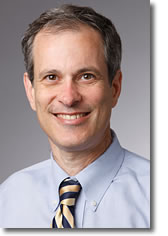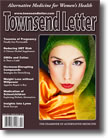Research Studies Show Value of Ayurvedic Methods
Charles Elder, MD, MPH, is a senior physician in the Department of Internal Medicine at Kaiser Permanente Northwest. In addition, he has a continuing interest in research on complementary and alternative medicine, and serves as an affiliate investigator with the Kaiser Permanente Center for Health Research in Portland, Oregon.
 Currently, Elder is the principal investigator on a "Randomized Trial of Tapas Acupressure for Weight loss Maintenance." Tapas Acupressure was developed in 1994 by Tapas Fleming, a California acupuncturist. It combines self-acupressure, lightly touching specific pressure points on the face and the back of the head, with mental imagery to help people deal with specific problems. The method has been used to treat trauma, stress, and food allergies, but this is the first time that it has been tested in a large clinical trial. Currently, Elder is the principal investigator on a "Randomized Trial of Tapas Acupressure for Weight loss Maintenance." Tapas Acupressure was developed in 1994 by Tapas Fleming, a California acupuncturist. It combines self-acupressure, lightly touching specific pressure points on the face and the back of the head, with mental imagery to help people deal with specific problems. The method has been used to treat trauma, stress, and food allergies, but this is the first time that it has been tested in a large clinical trial.
This is a two-phase study. Researchers recruited 472 obese Kaiser members who participated in an intensive six-month weight loss program. Those who attended at least 70% of the weight-loss sessions and lost at least 10 pounds were eligible for the second phase of the study, which focused on maintaining weight loss.
In this phase, both groups met once a month for an hour and a half, over the next six months.
"In one group they learned to use the self-acupressure technique and practiced it," Elder says. "They would use it at home, and then at the next meeting they'd all discuss how things were going." In the second group, members met for continuing social support, with a professional facilitator. Participants discussed how they were doing, and shared ideas and positive reinforcement. "In a earlier pilot study, Tapas Acupressure did show superiority in helping people maintain weight loss," says Elder. "We are currently compiling the data from the larger study."
Earlier, Elder was the principal investigator on a "Pilot Trial of Vedic Medicine for Type 2 Diabetes," which compared health outcomes for 60 patients newly diagnosed with type 2 diabetes. They randomly received either Ayurvedic care or usual care. Patients who were assigned to the Ayurvedic approach were treated with an Ayurvedic diet, exercise guidelines that included yoga instruction, treatment with an herbal supplement that has traditionally been used for diabetes, plus instruction in transcendental meditation as a stress reduction technique. The usual-care group attended a series of four classes on diabetes care, along with follow-up visits with their physicians.
"This was a really interesting study," Elder says. "One of the challenges in complementary medicine research is that in studies of Western medicine and drugs, we generally study a single modality, such as a particular antibiotic for a specific infection. However, when we study alternative medicine systems such as Ayurveda, in many of these systems the treatment is multi-modality."
In the diabetes pilot study, the researchers learned that Ayurvedic care was an acceptable intervention, and showed positive trends in terms of outcomes such as blood sugars and lipid levels. "This approach warrants a closer look," Elder says. "We want to carry this to the next step, and we have an application in the pipeline for additional research funding."
Ayurvedic Medicine Complements Conventional Care
Elder has taken several training courses in Ayurvedic medicine for physicians. "Ayurveda is the primary health-care system of India. Ayurveda is to India as Traditional Chinese Medicine is to China," he says. "One reason it is appealing is that it has been around for so long."
Ayurveda starts by looking at each patient's basic constitution plus imbalances that can lead to disease. Ayurvedic practitioners help patients return to a healthy balance, better able to resist and recover from disease, through herbal medicines, yoga, and changes in diet and lifestyle.
"One thing that is especially appealing to me as a Western-trained physician is that it complements Western medicine quite well," Elder says. "Ayurveda is prevention-oriented, and considering some of the areas where we are challenged in Western medicine, Ayurveda does a good job of filling the gaps. Ayurveda emphasizes prevention through diet, daily routine, and self-care."
Kaiser Permanente Northwest has its own integrative medicine clinic. Patients throughout the region may be referred either because they specifically request holistic care, or because their physician thinks they would benefit from it. As part of the intake process, Elder teaches a two-hour group session based on Ayurvedic approaches to care. Members learn the basic vocabulary and fundamental approaches to diet, daily routine, and exercise. After attending the group session, most patients follow up with a return visit for an individual consultation.
Kaiser routinely surveys its members about their experiences; survey data show excellent self-reported outcomes for patients who attend this clinic.
Meditation, Yoga: Cornerstones of Preventive Health
When Elder was a medical student at Boston University School of Medicine, he explored various forms of meditation. "I grew up in a small town in northeastern Ohio, so living in Boston meant culture shock, with a fair amount of stress. Because it's a dynamic city with many forms of yoga and meditation, I began exploring various options."
Elder recalls that as a medical student he experienced a great deal of pressure, with a heavy workload, leading to severe headaches. "I found that when I practiced transcendental meditation, the headache would go away," he says. "When I couldn't concentrate, if I meditated it would clear problems out of my head, so I could refocus on my work more effectively."
Elder has maintained a consistent transcendental meditation practice ever since. He considers meditation to be an important aspect of preventive health care. "Meditation and yoga are key components of the oriental systems of medicine, both Ayurveda and Chinese medicine," he says. "Learning these methods can be the cornerstone of maintaining health, controlling stress, and balancing your physiology."

Resources
Kaiser Permanente Center for Health Research: http://www.kpchr.org
For more information on Ayurveda, Elder recommends two websites:
http://www.banyanbotanicals.com/constitutions
http://www.mapi.com/maharishi_ayurveda/research/index.html
Elaine Zablocki has been a freelance health-care journalist for more than 20 years. She was the editor of Alternative Medicine Business News and CHRF News Files. She writes regularly for many health-care publications.
|



![]()
![]()
![]()

 Currently, Elder is the principal investigator on a "Randomized Trial of Tapas Acupressure for Weight loss Maintenance." Tapas Acupressure was developed in 1994 by Tapas Fleming, a California acupuncturist. It combines self-acupressure, lightly touching specific pressure points on the face and the back of the head, with mental imagery to help people deal with specific problems. The method has been used to treat trauma, stress, and food allergies, but this is the first time that it has been tested in a large clinical trial.
Currently, Elder is the principal investigator on a "Randomized Trial of Tapas Acupressure for Weight loss Maintenance." Tapas Acupressure was developed in 1994 by Tapas Fleming, a California acupuncturist. It combines self-acupressure, lightly touching specific pressure points on the face and the back of the head, with mental imagery to help people deal with specific problems. The method has been used to treat trauma, stress, and food allergies, but this is the first time that it has been tested in a large clinical trial. 